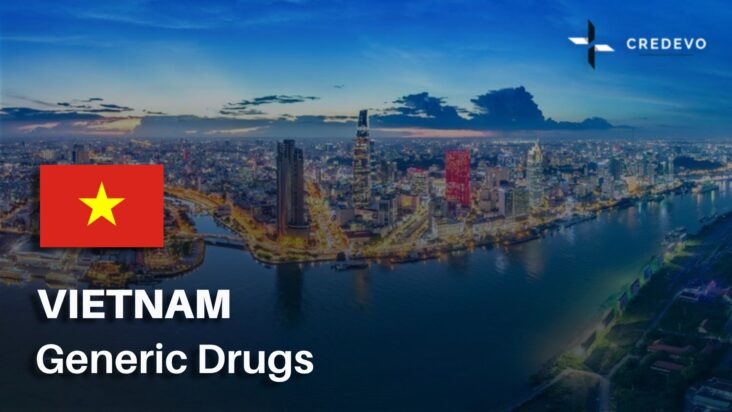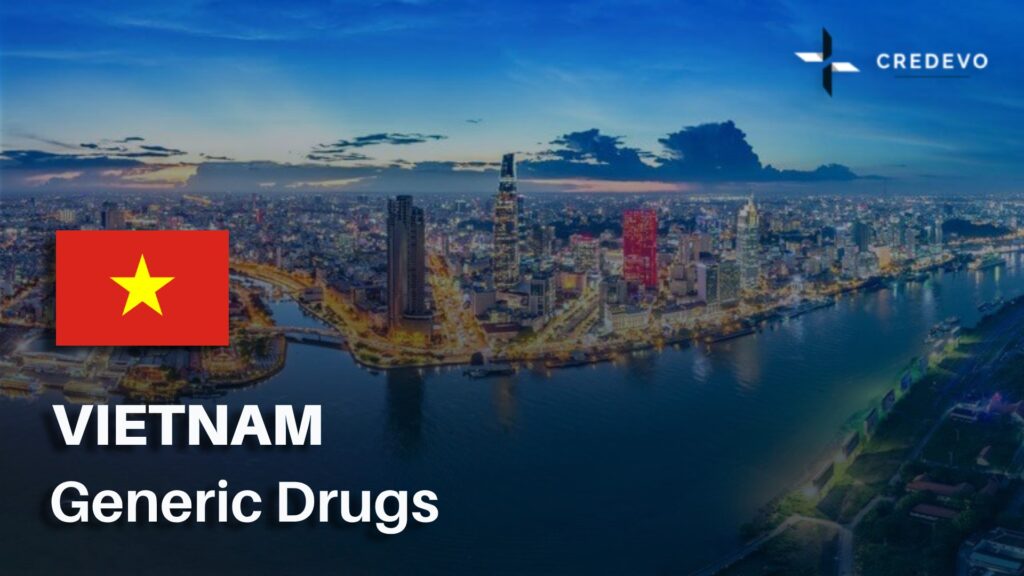Vietnam Generic Drug Registration Process

The Vietnam generic drug market is growing rapidly with increasing interest in many overseas manufacturers to register their drugs. Vietnam’s pharmaceutical market, along with generic drugs, has grown significantly in the last two years by 10% to US$5.2 billion and is estimated to reach US$6.6 billion this year. This expanding market growth contributes to the country’s per capita spending of US$85 billion for pharmaceuticals today.

Reasons for pharmaceutical market growth in Vietnam
Several reasons contribute to the pharmaceutical market growth in Vietnam, such as;
- Favorable changes in the government policies and domestic regulations of imported drugs
- Growing demand for quality healthcare with rising incomes in Vietnam
- Higher demand for affordable medicines
- Significant healthcare spending due to the continuous rise of the elderly population over the age of 60 years with changing disease pattern
Disease trends in Vietnam
- Around 10% of Vietnamese are diabetes patients.
- 116,000 Vietnamese die from cancer each year.
- 73% of the total deaths account for noncommunicable diseases in Vietnam.
- 30% of deaths nationwide account for cardiovascular disease.
- In recent years, the top four causes of death were cerebrovascular .disease, coronary heart disease, Alzheimer’s disease, and lung cancer.
Opportunities for foreign generic drug manufacturers in Vietnam
- Currently, most domestic companies are focused on producing generic drugs as they lack research and development capacity for the new drug. However, even in the generic drug segment, Vietnam only meets about 40% of the domestic demand.
- In Vietnam, most national manufacturers can only produce medium-low quality generic drugs as they only have WHO-GMP standards.
- Due to this, much of Vietnam’s spending is on pharmaceuticals. In 2017, the government spent around US$2.1 billion on imported pharmaceuticals to meet domestic product demands and only US$113 million on exported products. In 2018, the import turnover hit US$3 Billion.
- Only 17 facilities, in Vietnam, o have EU-GMP or PIC/S-GMP standards. That significantly prevents sales access to domestic hospitals, as the tier 1-2 generics need to be EU-GMP or PIC/S-GMP manufacturing standards. In 2019, domestic hospitals accounted for 75% of Vietnam’s pharmaceutical industry revenue of around $4.9 billion.
- Only Pymepharco and Imexpharm are capable of bidding into Tier 1 and 2 due to having EU-GMP standards.
- Programs designed to attract more foreign direct investment also support the pharmaceutical market, as domestic companies look for partners to help transform production technology.
Regulatory authority for Generic drugs in Vietnam?
Pharmaceutical products in Vietnam are under the management of the Ministry of Health (MOH).
The Drug Administration of Vietnam (DAV) is one of the divisions under the Ministry of Health (MoH) and it handles the overall responsibility for the registration of pharmaceutical products to market in Vietnam.
Who can apply for registration of Generic drugs in Vietnam?
The following entities are allowed to register pharmaceutical products in Vietnam.
- Domestic pharmaceutical manufacturers.
- Foreign companies, having a license to manufacture pharmaceuticals in Vietnam.
- Domestic entities that are allowed to trade in pharmaceuticals.
- Foreign entities who have a trade license.
Need support for your drug registration in Vietnam?
Credevo offers expertise in drug product registration, clinical trial regulations, and many more services in Vietnam. Check them out now!
The process to register generic drugs in Vietnam
The process to register generic drugs in Vietnam for the issuance of a marketing registration certificate involves the following steps.
- Step1: Review your product details and understand the regulatory requirements applicable to your product.
- Step2: Application dossier submission.
- Step3: Evaluation of application dossier.
- Step4: Respond to queries and obtain the product registration certificate.
Let’s discuss each step to understand the entire process to register the generic drug in Vietnam.
Step 1: Review your product details and understand the regulatory requirements applicable to your product.
It involves collecting information on the different regulatory aspects concerning generic product registration. For generic drugs, manufacturers need to prepare the application dossier complying with either ASEAN or ICH Common Technical Dossier.
Step 2: Compile and submission of application dossier
The dossier must contain a cover page, the product information sheet, etc. The applicant must arrange these documents in order of the table contents with separation between the sections, and the sections must have numbers for easy reference.
The following documents require separate sections enclosed with product information
- Bioequivalence study report.
- GMP-conformity assessment document regarding foreign manufacturers.
Part 1: The administrative dossier
- The documents in the case of application dossier of foreign drugs.
- GMP inspection application by foreign manufacturers.
- Inspection of documents about the manufacturing conditions.
Part 2: Contents of the Quality Documents includes
Report of bioavailability/bioequivalence study.
Step 3: Evaluation of the application dossier
From the date of receipt of the complete registration dossier, the Drug administration will review and send the dossier to expert evaluators. After evaluation, expert evaluators give their opinions to the Drug administration within a specified time.
Step 4: Respond to queries and receive the product registration
After the validation and assessment, if the dossier does not meet the requirements, the DAV usually issues a written response and states the reasons accordingly. DAV requests the applicant for supplementary documents or clarifies issues regarding the application dossier.
The DAV then reviews the supplementation and explanation from the applicant and issue a marketing registration certificate of the drug within the specified time.
The dossier for which the Drug administration seeks opinions from Advisory Council presents them to the council and approves accordingly after the Council’s response.
Approval timeline
Generic drug approval usually takes 14-22 months from the date of submission of the application dossier. Compared to the developed countries, the time taken to evaluate new and generic drug approvals is shorter in Vietnam. However, the application submission process is rigorous.
Approval fees
The government Filing fee for marketing Authorization applications in Vietnam ranges between $220-300 USD which depends on the requirements whether the medicinal products have data confidentiality or bioequivalent dossier or clinical dossier requirements.
Do you need support or have queries on drug registration requirements?
Credevo offers a wide range of drug development and regulatory services in Vietnam. Choose one of the following options to connect with us.
Get the report on the Generic drug registration process in Vietnam.
Note: This report will be charged @ $359.
Do you have a query? Just ask experts at Credevo.
Note: “Ask Credevo Expert” will be charged @ $50 / inquiry. Any inquiry requiring more than 30 min of expert’s time will incur additional charges.
Looking for a quotation? Just provide relevant info and we will send you the details.
References
- https://www.makrocare.com/WhitePapers/se-asian-regulatory-environment-p2.pdf
- https://kenfoxlaw.com/requirements-of-new-pharma-registration-dossier-in-vietnam
- https://pharmaboardroom.com/legal-articles/regulatory-pricing-and-reimbursement-overview-vietnam/
- https://www.makrocare.com/WhitePapers/se-asian-regulatory-environment-p2.pdf
- https://ccs.ncgm.go.jp/050/060/010/idf-04-06/04_IIDF-6th-Presentation-TN-2019-06-07.pdf
- https://vanbanphapluat.co/decree-54-2017-nd-cp-guidelines-for-implementation-of-the-law-on-pharmacy
- https://vanbanphapluat.co/circular-no-08-2010-tt-byt-guiding-report-of-bioavailability-bioequivalence